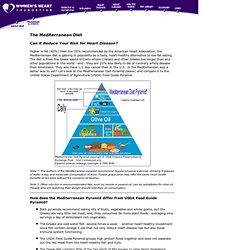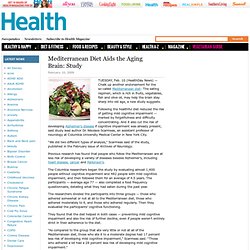

Mediterranean Diet: Basic Ingridients and Recipes of a Mediterranean Diet. A total diet and lifestyle approach continues to be one of the best prescriptions for a long, healthy life.

By Kara Mayer RobinsonWebMD Medical Reference The Promise Delicious food that's stood the test of time and helps keep you healthy for years to come. That's at the heart of the traditional Mediterranean diet. There’s no single Mediterranean diet plan, but in general, you'd be eating lots of fruits and vegetables, beans and nuts, healthy grains, fish, olive oil, small amounts of meat and dairy, and red wine.
This lifestyle also encourages daily exercise, sharing meals with others, and enjoying it all. Does It Work? This diet scores big for heart health. Continue reading below... For weight loss, you’ll have better results if you stick with it more than six months, get regular exercise, and cut back on how much you eat. What You Can Eat and What You Can't You’ll eat mostly plant-based foods, including fruits and vegetables, potatoes, whole-grain bread, beans, nuts, and seeds. Mediterranean-diet-reduces-diabetes-drugs. Posted on Sept. 24, 2009, 6 a.m. in DiabetesDietWeight and Obesity In that low-carbohydrate and low-fat calorie-restricted diets are recommended for weight loss in overweight and obese people with type 2 diabetes, a study has found that the Mediterranean diet may reduce the need for antihyperglycemic drugs in patients with newly diagnosed type 2 diabetes.

Katherine Esposito, from the Second University of Naples (Italy), and colleagues studied 215 overweight people (BMI greater than 25 kg/m2) between the ages of 30 and 75 who were newly diagnosed with type 2 diabetes, had never been treated with antihyperglycemic drugs, and had hemoglobin A1c (HbA1c) levels less than 11%. Among those diabetics who followed a Mediterranean-style diet, only 44% required antihyperglycemic drug therapy, compared with 70% of patients who followed a standard low-fat diet. Health Headlines MORE » Thylakoids may help to decrease feelings of hunger. Mediterranean. Can it Reduce Your Risk for Heart Disease?

Higher in fat (40%) than the 30% recommended by the American Heart Association, the Mediterranean diet is gaining in popularity as a tasty, heart-healthy alternative to low-fat eating. The diet is from the Greek island of Crete where Cretans and other Greeks live longer than any other populations in the world - and - they are 20% less likely to die of coronary artery disease than Americans. They also have 1/3 less cancer than in the U.S. Is the Mediterranean way a better way to eat? Let's look at the Mediterranean Diet Pyramid (below) and compare it to the United States Department of Agriculture (USDA) Food Guide Pyramid. Note 1: The authors of the Mediterranean pyramid recommend regular physical exercise, drinking 6 glasses of water a day and moderate consumption of wine. Note 2: Other oils rich in monounsaturated fats, such as canola or peanut oil, can be substituted for olive oil. Is this a good diet for people with known heart disease?
Mediterranean Diet Aids the Aging Brain: Study. TUESDAY, Feb. 10 (HealthDay News) — Chalk up another endorsement for the so-called Mediterranean diet: The eating regimen, which is rich in fruits, vegetables, fish and olive oil, may help the brain stay sharp into old age, a new study suggests.

Following the healthful diet reduced the risk of getting mild cognitive impairment — marked by forgetfulness and difficulty concentrating. And it also cut the risk of developing Alzheimer’s disease if cognitive impairment was already present, said study lead author Dr. Nikolaos Scarmeas, an assistant professor of neurology at Columbia University Medical Center in New York City.
“We did two different types of analysis,” Scarmeas said of the study, published in the February issue of Archives of Neurology. Previous research has found that people who follow the Mediterranean are at less risk of developing a variety of diseases besides Alzheimer’s, including heart disease, cancer and Parkinson’s. “You see what is called a dose response. More information.